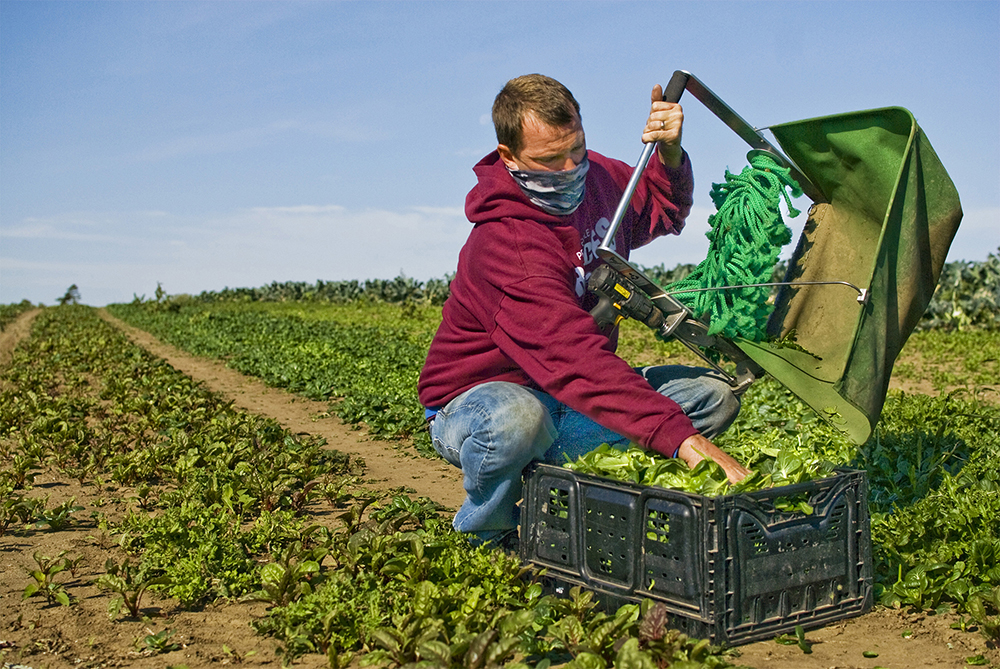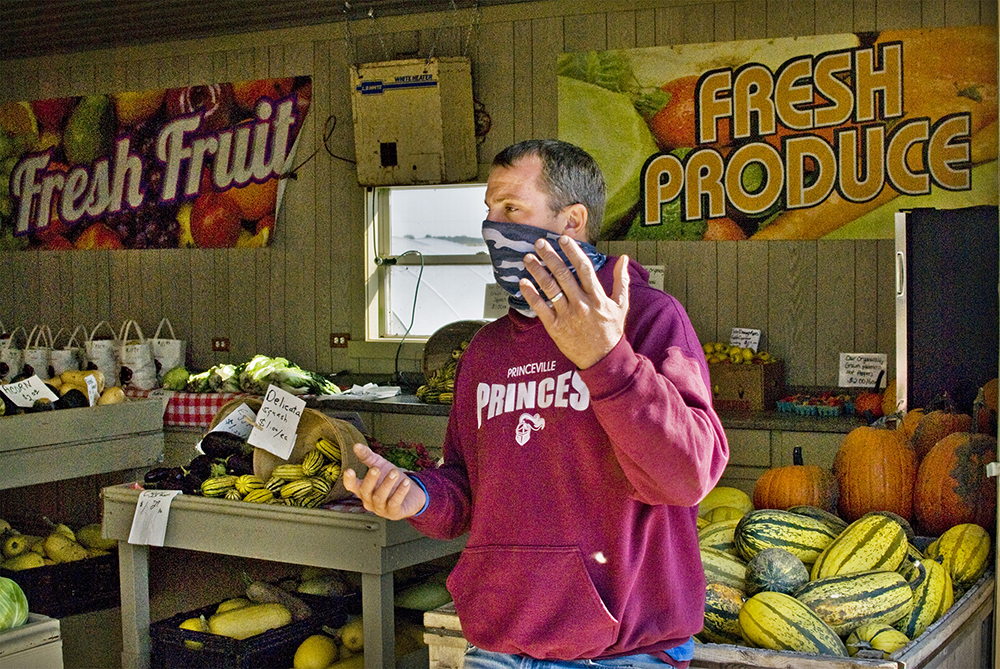
Jimmy Buckley runs his hand-held lettuce picker on his farm near Princeville. Buckley grows fruit and vegetables on 30 acres for hundreds of customers in Central Illinois at a time when COVID-19 has disrupted the corporate food system and left store shelves empty. (COMMUNITY WORD PHOTO)
For years, Jimmy Buckley watched government subsidies go to big corn and soybean farmers growing crops that become fuel and animal feed. Buckley grows organic fruits and vegetables for hundreds of people in central Illinois yet until this year, he never received a government subsidy.
The small subsidy he received several months ago through the Specialty Crop Block Grant program is a game changer, helping with equipment repair and an emergency dental problem.
In a state with thousands of acres in subsidized, industrial corn and soybeans, “specialty farmers” grow food for human beings.
Buckley’s subsidy is tiny compared with the hundreds of thousands of dollars channeled to corn and soybean farmers each year.
Liz Rupel, policy expert with the Illinois Stewardship Alliance, said the COVID-19 pandemic has been devastating, but it exposed the glaring cracks in our food system.
“Specialty crops are our lifeline,” Rupel said. “They enrich the soils, add diversity and are great for the environment because they sequester carbon. We have to look beyond corn and soybeans. Over 90% of our food in Illinois is imported, but we have great soils and great farmers like Jimmy growing food for our communities.”
Buckley, 35, is a fourth-generation farmer with 30 acres teaming with bees and earthworms. He enriches and preserves his soils, has no drainage tiles and uses no chemical fertilizers and pesticides.
Especially now when COVID-19 has disrupted world food distribution, Buckley can’t understand why corn-based ethanol and soybean-based livestock feed get more assistance from the federal government than he does.
“It’s hard to stay afloat. I work seven days a week and have worked 190 days straight. Last week, I put in a 20-hour day. But I love this business,” he said. “Most medium-sized specialty growers are in their 60s and 70s. We need to make sure the next generation stays on the farm.”
Buckley said it’s physically-demanding work. His mother and uncle who are specialty farmers have each had multiple orthopedic surgeries.
He’s always looking for ways to streamline his operation, but hiring help isn’t always the answer. Recently, a high school student hired for the summer called in to say it was too hot to work in the fields but he’d show up for work the following week.
“The crops won’t wait,” Buckley said.
He recently purchased a $660 lettuce/spinach picker that helps him quickly trim leaves from rows of crops. He can now pick by himself in 1½ hours what used to require three people picking for a day.
Buckley constructed a greenhouse and is heating his farm stand. He sells through a CSA, his “Garden Spot” farm stand on Illinois Route 90 outside Princeville, at Peoria Riverfront Market and Metro Market. He expects to have ample produce at his Metro Market stall for Thanksgiving, and he communicates regularly through his Facebook page.
“The food I grow stays local. My money stays here and helps with taxes and schools. My money goes back into the community. If we lose people like me, where is our food going to come from?” he said.
If farmers like Buckley get out of the business, people will be forced to rely on corporate farms and food shipped thousands of miles from California and Florida.
U.S. Sen. Dick Durbin, D-IL, issued this statement for this article: “I recently spoke with specialty growers from the Illinois Stewardship Alliance and the Illinois Young Farmers Coalition about the unique challenges faced by these farmers in managing risk from weather and the pandemic. Recent farm bills have made progress in helping specialty farmers, but more can be done, and specialty crop grants are just one example. USDA must conduct better outreach, offer simplified applications, promote markets, and expand and tailor more programs to recognize the increasing role of specialty farms in rural Illinois.”
According to a USDA spokesperson, the FY2020 Specialty Block Grant Program distributed $72.4 million to agencies and departments in all 50 states.
Noah Sabich, who grew up in Springfield and is now managing director of Cimbria Capital in Milwaukee, said, “Especially during a global shutdown due to COVID, local food systems are more important. Society is becoming more aware of food quality and nutritional density. Local food systems are part of our future.”
He sees a groundswell of demand for local food.
Sabich said there is a role for both large corporate farms and small specialty farms but believes it’s unfair when government subsidies rarely reach small farmers.
He expresses a “guarded sense of optimism” that smaller, decentralized farming will retain a strong foothold, and “shop local” furthers understanding of the economic reinvestment in community and environment.
Rupel, with the Illinois Stewardship Alliance, said support for local specialty farmers is a voting issue. The Alliance has compiled a guide “Illinois Food & Farm Voter Guide” to highlight issues and candidates’ positions: https://www.ilstewards.org/old-ffg-alldistricts/
“Federal legislators need to realize our food system has to change. We need farmers like Jimmy to share their stories. If no one knows the issues, nothing will change,” she said. “Sharing stories changes the narrative and builds power.”
After voting for candidates that support specialty farmers, Rupel suggests planning your Thanksgiving table around the cornucopia of local food.
“This bounty extends even into November,” she said, and includes turkey, sweet potatoes, Brussels sprouts, greens, pecans, pumpkins, butternut squash, apples and more.
“We connect with people through food. When we learn the history of where our food comes from and something about those who grow it, that food then brings us together,” she said.
Check Facebook for the produce Jimmy Buckley, Garden Spot Produce, Princeville, will have for sale Saturday mornings at Metro Market in the weeks before Thanksgiving.

Jimmy Buckley (COMMUNITY WORD PHOTO)

Recent Comments